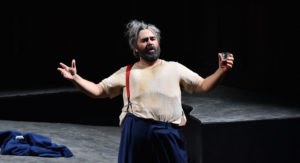
Roberto de Candia as Falstaff (Photo: Roberto Ricci)
Every time I hear about an opera based on a play, my antenna goes up.
I was a theatre writer before I was an opera writer, and a theatre performer and aficionado before all of that. In my youth I spent countless hours pouring over journals, books, and audio recordings of works by (and this is by no means a comprehensive list) Pinter, Beckett, Miller, Pirandello, Artaud, O’Casey, Orton, Moliere, and of course, Shakespeare. When my mother would take me to operas based on plays, I would always wince, thinking, “surely this won’t be as good as the original.” Ah, youth.
Living in Dublin and London allowed for many fantastic nights of theatre, with some of my favorite moments unfolding at (or being connected with) the Almeida Theatre in Islington, north London. When Jonathan Kent, whose work I had long admired, moved into opera, I was immediately intrigued. The flow between the worlds of theatre and opera has always been a natural one, of course, but owing to youthful arrogance (and more than a bit of romance around the world of theatre), I couldn’t see or appreciate it clearly. I still love theatre but whenever I go now, I find myself missing the music.
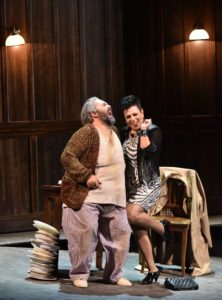
Roberto de Candia as Falstaff and Sonia Prina as Mrs. Quickly (Photo: Roberto Ricci)
Opera is, of course, a fluid art form rich in drama and rife with possibilities for presentation, something various head honchos in opera know and riff on, to frequently wondrous effect. (See: Barry Kosky’s work, especially with Komische Oper Berlin; the work of Pierre Audi and Robert Carsen; the recent 017 Festival, courtesy Opera Phildelphia, for just a few examples.) Making opera theatrically gripping isn’t always easy, however much creativity, talent, and goodwill is extant.
When it comes to staging the work of Giuseppe Verdi, who adored the work of Shakespeare, things can get even more sticky. A director is faced with certain choices: do the stodgy Shakespeare thing, involving various shades of grey and frilly collars? Or do super-high-concept, involving surreal set pieces and bizarre effects? Listening to the music and text, together, as one unit, is of course, the director’s job. Italian director Jacopo Spirei excels in integrating drama, visuals, theatricality and music into one satisfying whole. He gets opera, he gets theatre, he gets why you might be resistant to combining them — and he thinks you should come anyway.
I first spoke with Jacopo earlier this year when he directed Don Giovanni at the San Francisco Opera, in a remount of a work originally done by Gabriel Lavia in 2011. He’s just opened his entirely-own production of Falstaff at the Festival Verdi in Parma, Italy. Having gotten his start working with British director Graham Vick (who has a production of Stiffelio at this year’s Festival Verdi involving the audience standing and moving), I thought Spirei’s thoughts around the theatre-meets-opera issue would be very valuable.
Falstaff is based on Shakespeare’s The Merry Wives of Windsor, and involves the jocular title character, Sir John Falstaff, in various misadventures with a variety of ladies and angry husbands. Basically, Sir John’s giant ego gets him in trouble. Frequently played as a jolly big man with a beard and a rolling laugh, this famous literary character is often presented as the stuff of stage comedy, a figure we laugh with and laugh at, a bon vivant whose lust for life knows no bounds. This is fun, but I wondered if Jacopo saw something more; the photos of the production (which I will be seeing the end of this month) seem to suggest so, with a dirty Union Jack flag being used at various points, to say nothing of baritone Roberto de Candia’s dishevelled appearance and modern dress. What was Jacopo thinking as he directed this in one of Italy’s most notoriously fussy houses for opera? Find out.
How is directing an opera based on Shakespeare different?
We could say that Verdi and Shakespeare is a very happy match; whenever the two have met great art has been produced.
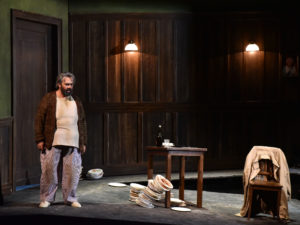
Roberto de Candia as Falstaff (Photo: Roberto Ricci)
Who is Sir John Falstaff? What does he have to say to us in 2017?
It’s easier to say what Falstaff is not: he’s not a moral creature, he’s not young, he’s not thin, but he has been in the past all of these things. Falstaff is a man who has known glory, wealth, poverty, defeat and survived through it all with a smile and a philosophy. He tells us how morals and honor are just words created but mankind. He’s a man who survives, who values a good glass of wine more than many words; at the same time he’s a man who represents old values in a changing society, so he’s a character that, like every human being, lives in a constant contradiction. He does not understand the modern world but also wants to participate in it, does not want to let go, wants to show that he still “has it.” I can’t think of anything more actual than that — we live in a “like” obsessed society where youth and beauty is the only value. It’s not easy being old today!!!
There is a tendency with many productions of Falstaff to emphasize the comic aspects; your production seems more serious and thoughtful. Why this approach?
The opera is funny, but not comic. It’s an opera about different stages of life, and has a strong dose of cynicism; it’s a comedy with teeth! I have approached the opera from the text, like Verdi did, so I’ve developed what’s on the page, I have researched with the cast and what we’ve discovered is what we are presenting to the audience today.
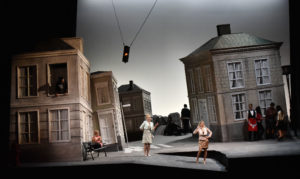
The cast of ‘Falstaff’ (Photo Roberto Ricci)
The design sense of this production is very unique: contemporary, somewhat expressionist, familiar. What were your visual influences? What was your process with designer Nikolaus Webern?
With Nikolaus we always start from the text and we discuss a lot before even starting to design. One big element that inspired us is the weight of the protagonist that creates an imbalance in the perfect lives of Windsor’s bourgeois world, so we have worked on this loss of balance in life.
A great visual influence for me came from all the years working at Glyndebourne, so the village, the house, the pub — they’re somewhat related to those years where I was assisting Graham Vick and reviving his shows in this magical festival. You can see in the show the village of Lewes, the house of the owners of the festival and in fact. almost every single pub in the neighbourhood.
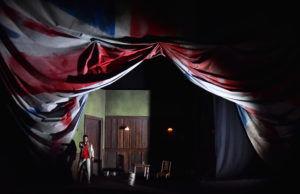
Giorgio Caoduro (Ford) in a scene from ‘Falstaff’ (Photo: Roberto Ricci)
How much did Brexit influence your direction with this work?
Funny you ask — whenever I presented the production to the cast and the theatre I said, “Falstaff at the time of Brexit.” In a way there is a relationship to what’s happening to England now, but I’ve treated it more as an example than anything else. I believe we have a lot to learn from what England is going through politically and socially. I don’t and never believed that division is the answer. In a bizarre way England is behaving like Falstaff, still thinking an Empire is possible and not accepting reality and how the world has changed. Brexit has been a very divisive subject within England and Great Britain in general.
What’s it like to direct at Festival Verdi in Parma, a city known for its strong opera opinions?
It’s an honor to be directing at this prestigious festival next to names like Vick and (Hugo) De Ana (directing Jerusalem at the Festival Verdi this year); I was thrilled at the idea of working in Verdi’s land for an audience that loves and deeply knows Verdi. I enjoyed the process, never fearing any good or bad reaction from the audience. As long as you are loyal to your vision, there’s nothing to fear.

Gianmarco Segato
Love the look of this production! There’s a hint of de Chirico in Spirei’s wonky English village. Love the idea of an Italian directing a vision of England instigated by another Italian!